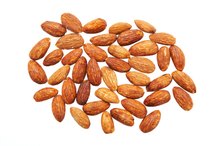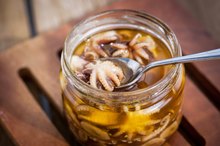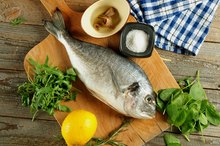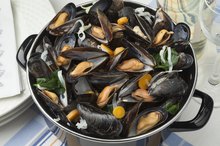Are Smoked Oysters in Sunflower Oil Good for You?
Oysters are sea creatures that are often eaten raw with lemon juice or Worcestershire sauce. Raw seafood poses certain health dangers so smoking them is a healthier alternative. Oysters provide numerous vitamins and minerals and are low in fat, and smoked versions are infused with a bold flavor. Served with sunflower oil, oysters contain more fat, but most of it is healthy, unsaturated fat. Once you know more about the nutrition of smoked oysters in sunflower oil, you can determine if they deserve a place in your diet.
Calories and Fat
A 3-ounce serving of smoked oysters contains 139 calories. The same serving of smoked oysters contains 3.91 grams of total fat, with less than 1 gram being saturated fat. The remainder of the fat in a serving of smoked oysters is primarily polyunsaturated fat. Served with 1 teaspoon of sunflower oil, your smoked oysters will have an additional 40 calories and 4.5 grams of total fat. Almost all of the fat in sunflower oil is polyunsaturated. Polyunsaturated fat might help lower your cholesterol levels, which can decrease your risk of cardiovascular problems. These fats might also lower your risk of type 2 diabetes.
- A 3-ounce serving of smoked oysters contains 139 calories.
- The remainder of the fat in a serving of smoked oysters is primarily polyunsaturated fat.
Iron and Zinc
Nutrition Facts for Anchovy Fillets in Oil
Learn More
Smoked oysters contain an impressive amount of iron and zinc. Iron contributes to the formation of healthy red blood cells, supports a healthy immune system and aids in cell growth. Adults need between 8 and 18 milligrams of iron each day. A 3-ounce serving of smoked oysters contributes 7.82 milligrams toward that goal. Zinc promotes healthy immunity and aids in wound healing and cell division. Adults need 8 to 11 milligrams of zinc each day. A serving of smoked oysters contains 28.25 milligrams. Sunflower oil does not contribute any additional iron or zinc.
- Smoked oysters contain an impressive amount of iron and zinc.
- A 3-ounce serving of smoked oysters contributes 7.82 milligrams toward that goal.
Additional Minerals
While sunflower oil does not contribute any minerals to your oysters, the oysters themselves are a healthy source of potassium, with 257 milligrams toward the 4,700 milligrams you need each day. The same serving also provides you with 37 of the 310 to 420 milligrams of magnesium you need each day. The oysters supply 207 of the 700 milligrams of phosphorus you need on a daily basis. You get a small dose of calcium with 14 of the 1,000 milligrams of calcium you need daily.
- While sunflower oil does not contribute any minerals to your oysters, the oysters themselves are a healthy source of potassium, with 257 milligrams toward the 4,700 milligrams you need each day.
- The oysters supply 207 of the 700 milligrams of phosphorus you need on a daily basis.
Vitamins
The Nutrition of Smoked Almonds
Learn More
Both smoked oysters and sunflower oil provide you with key vitamins. A 3-ounce serving of smoked oysters supplies you with 10.9 milligrams of vitamin C and 13 micrograms of folic acid. More significantly, a 3-ounce serving of smoked oysters supplies you with nearly 25 micrograms of vitamin B-12 -- far more than the 2.4 micrograms you need each day. Vitamin B-12 is necessary for the formation of red blood cells, the function of your neurological system and for DNA synthesis. One teaspoon of sunflower oil adds almost 2 of the 15 milligrams of vitamin E you need each day. Vitamin E plays a role in your immune function and might help neutralize free radicals that can lead to cancer.
- Both smoked oysters and sunflower oil provide you with key vitamins.
- More significantly, a 3-ounce serving of smoked oysters supplies you with nearly 25 micrograms of vitamin B-12 -- far more than the 2.4 micrograms you need each day.
Related Articles
References
- National Institutes of Health: Dietary Supplement Fact Sheet: Iron
- National Institutes of Health: Dietary Supplement Fact Sheet: Zinc
- National Institutes of Health: Dietary Supplement Fact Sheet: Vitamin E
- National Institutes of Health: Dietary Supplement Fact Sheet: Vitamin B12
- MayoClinic.com: Dietary Fats: Know Which Types to Choose
- Medline Plus: Phosphorus in Diet
- National Institutes of Health: Dietary Supplement Fact Sheet: Magnesium
- Mollusks, oyster, Pacific, raw. FoodData Central. U.S. Department of Agriculture. Published April 1, 2019.
- 7 Reasons to Love Oysters-Even If You Hate Them. Cleveland Clinic. Updated 2016.
- Zinc: Fact Sheet for Health Professionals. National Institutes of Health, Office of Dietary Supplements. Updated 2020.
- 10 Tips: Eat Seafood Twice a Week. ChooseMyPlate U.S. Department of Agriculture.
- Ihn HJ, Kim JA, Lim S, et al. Fermented oyster extract prevents ovariectomy-induced bone loss and suppresses osteoclastogenesis. Nutrients. 2019;11(6). doi:10.3390/nu11061392
- Tischmann L, Drummen M, Gatta-Cherifi B, et al. Effects of a high-protein/moderate-carbohydrate diet on appetite, gut peptides, and endocannabinoids-A preview study. Nutrients. 2019;11(10). doi:10.3390/nu11102269
- Kaufman C. Foods to Fight Iron Deficiency. Academy of Nutrition and Dietetics. Updated 2020.
- Shellfish allergy is not a shell game. American Academy of Asthma, Allergy & Immunology. Updated 2020.
- Risks of Eating Raw Oysters and Clams. Virginia Department of Health. Updated 2018.
- Types of oysters. Berkeley Wellness University of California. Updated 2015.
- Dolaski AM. True or False: Only Eat Oysters in Months That End in 'R'. American Council on Science and Health. Updated 2016.
- Phillips KE, Satchell KJ. Vibrio vulnificus: From oyster colonist to human pathogen. PLoS Pathog. 2017;13(1):e1006053. doi:10.1371/journal.ppat.1006053
- Hassard F, Sharp JH, Taft H, et al. Critical review on the public health impact of norovirus contamination in shellfish and the environment: A UK perspective. Food Environ Virol. 2017;9(2):123–141. doi:10.1007/s12560-017-9279-3
Writer Bio
Sara Ipatenco has taught writing, health and nutrition. She started writing in 2007 and has been published in Teaching Tolerance magazine. Ipatenco holds a bachelor's degree and a master's degree in education, both from the University of Denver.









